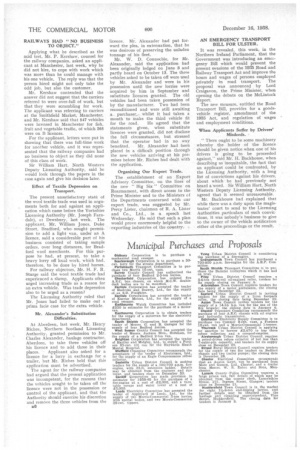RAILWAYS HAD "NO BUSINESS TO OBJECT."
Page 40

If you've noticed an error in this article please click here to report it so we can fix it.
Applying what he described as the acid test, Mr. P. Kershaw, counsel for the railway companies, asked an applicant at Manchester, last week, why he did not hire, to cope with work which was more than he could manage with his one vehicle. The reply was that the person hired might not only take the odd job, but also the customer.
Mr. Kershaw contended that the answer did not suggest that the carriers referred to were over-full of work, but that they were scrambling for work. The applicant was referring to carriers at the Smithfield Market, Manchester, and Mr. Kershaw said that 547 vehicles were licensed in Manchester for fish, fruit and vegetable traffic, of which 265 were on B licences.
For the applicant, letters were put in showing that there was full-time work for another vehicle, and it was represented that the railway companies had no business to object as they did none of this class of work.
Sir William Hart, North Western Deputy Licensing Authority, said he would look through the papers in the case again and give his decision later.
Effect of Textile Depression on Transport.
The present unsatisfactory state of the wool textile trade was used in arguments both for and against an application which came before the Yorkshire Licensing Authority (Mr. Joseph Farndale), at Dewsbury, last week. The applicant, Mr. William Jones, Duke Street, Bradford, who sought permission to add a light van, under an A licence, said a considerable part of his business consisted of taking sample orders, over long distances, for Bradford wool merchants. For this purpose he had, at present, to take a heavy lorry off local work, which had, therefore, to be done by hired horses.
For railway objectors, Mr. H. F. R. Sturge said the wool textile trade had experienced a slump. Applicants often urged increasing trade as a reason for an extra vehicle. Was trade depression also to be urged as a reason?
The Licensing Authority ruled that Mr. Jones had failed to make out a prima facie case for the extra vehicle.
Mr. Alexander's Substitution Difficulties.
At Aberdeen, last week, Mr. Henry Riches, Northern Scotland Licensing Authority, granted permission to Mr. Charles Alexander, haulage contractor, Aberdeen, to take three vehicles off his licence and to add three in their places. Applicant also asked for a licence for a lorry in exchange for a trailer, but Mr. Riches held that this application must be advertised.
The agent for the railway companies had argued that the present application was incompetent, for the reasons that the vehicles sought to be taken off the licence were not in the possession or control of the applicant, and that the Authority should exercise his discretion and remove the three vehicles from the 136 licence. Mr. Alexander had put forward the plea, in extenuation, that he was desirous of preserving the unladen tonnage of his fleet.
Mr. W. D. Connochie, for Mr. Alexander, said the application had been originally lodged on June 3 and partly heard on October 13. The three vehicles asked to be taken off were used by Mr. Alexander and were in his possession until the new lorries were acquired by him in September and substitute licences granted. The old vehicles had been taken possession of by the manufacturer. Two had been reconditioned and were still awaiting a purchaser, . whilst it had taken a month to make the third vehicle fit for the road. He agreed that the statements given, when substitute licences were granted, did not disclose the full circumstances, but stressed that the operator had in no way benefited. Mr. Alexander had been placed in a difficult position through the new vehicles arriving at his premises before Mr. Riches had dealt with the application.
Organizing Our Export Trade.
The establishment of an Export Advisory Committee, on the lines of the new " Big Six " Committee on Rearmament, with direct access to the Prime Minister and to the Ministers cf the Departments concerned with our export trade, was suggested by Mr. Percy Lister, chairman of R. A. Lister and Co., Ltd., in a speech last Wednesday. He said that such a plan would prove enormously helpful to the exporting industries of the country. ,• AN EMERGENCY TRANSPORT BILL FOR ULSTER.
It was revealed, this week, in the Northern Ireland Parliament, that the Government was introducing an emeigency Bill which would prevent the present evasions of the 1935 Road and Railway Transport Act and improve the hours and wages of persons employed privately in road transport. The proposal was announced by Lord Craigavon, the Prime Minister, when opening the debate on the McLintock Report.
The new measure, entitled the Road Transport Bill, provides for a goodsvehicle register, amendment of the 1935 Act, and regulation of wages and employment conditions.
When Applicants Suffer by Drivers' Misdeeds.
"There ought to be some machinery whereby the holder of the licence should be given notice when one of his drivers is going to be proceeded against," said Mr. H. Backhouse, when describing as inequitable, the fact that an applicant could be confronted, by the Licensing Authority, with a long list of convictions against his drivers, about which he had previously not heard a word. Sir William Hart, North Western Deputy Licensing Authority, agreed that it seemed unreasonable.
Mr. Backhouse had explained that while there was a duty upon the magistrates' court to send to the Licensing Authorities particulars of such convic. tions, it was nobody's business to give to the owner of the vehicle notification either of the proceedings or the result.




























































































